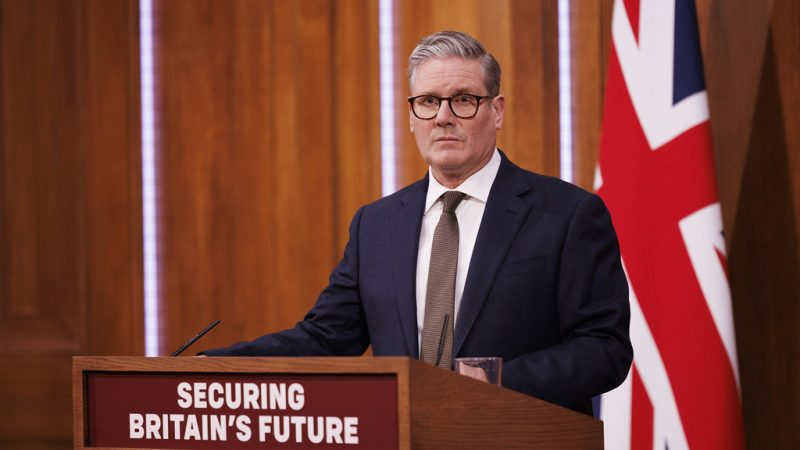
As ballots continue to be counted from May’s local elections, there will be a countless number of thinkpieces and social media dissections of what the results mean for Labour going forwards. What we can say conclusively, however, is that we should have performed far better than we have done.
The government has had a poor first election, achieving our lowest result in four decades. I am sorry to the council colleagues who have lost their seats, and those who should have been joining our ranks. That these results come less than a year on from our landslide victory should be a cause to rethink our approach.
READ MORE: Council by council Labour gains and losses – and its position in each mayor race
Less than 12 months after the election which have us our largest majority since 1997, we should have been making gains in these local elections. Part of the reason we have not is that, rather than delivering on the promise of a progressive alternative to fourteen years of Tory ruin, voters have watched the government flounder – too often from hurdles of our own making.
READ MORE: ‘‘Labour has lost in Runcorn – here are the eight things the party should do now‘
We were unlikely to receive a fair hearing from the right-wing press, but with the donations scandal many voters’ first glimpse of the new government in action – followed swiftly by unforced errors like cuts to winter fuel allowance or lifting the £2 bus cap – it is no surprise that some feel let down.
That the government is still pursuing its benefits cuts – which have already lead to a cross-factional rebellion while risking material hardship to the poorest – shows a party that is privileging fiscal rules over its missions. A government hard-wired towards kickstarting economic growth would not risk billions in potential productivity and tax revenues by forcing people into poverty.
Scroll to keep reading the story below….
There are numerous policy levers that would give Rachel Reeves the headroom she is searching for – for example, ending the work ban for people seeking asylum, or pursuing migration as an economic growth strategy as Spain has. They appear to have been ruled out from the get-go, suggesting more stock has been placed in avoiding press criticism than building back fairer.
But where we have struggled most is in dealing with Reform. Far too many – from members to ministers – have treated a rising Reform vote as an inevitability, taking as a given that we would lose hundreds of council seats or even the next general election to them. This has of course been fed by the media, but also our own party. Regardless of whether this was expectation-management or trying to motivate our activist base, it has helped to position a fringe party with four MPs as though waiting for its turn to govern.
A party that is privileging fiscal rules over its missions
The number one rule in politics is to not highlight your opponent to voters. Because for every person to might win over by presenting them as a bogeyman, you may persuade another that they have a viable chance of winning. And while highlighting Nigel Farage as a would-be NHS privatiser might strengthen a firm Labour voter’s resolve, those of us who reflexively dismissed the relentless smears against Miliband, Corbyn and Starmer will know they have a limited impact.
Losing Runcorn by 6 votes will continue to sting. Questions will be asked of whether Starmer had visited we might have done better. What is evident, however, is that launching our by-election campaign with an anti-migrant push gave Reform political relevance throughout the campaign; parroting their talking points only serves to strengthen their appeal.
READ MORE: Runcorn blame game begins – why did Labour lose?
Despite the Prime Minister doubling down on lowering migration we should be clear, too, that Reform’s popularity is not about migration. It is a symptom of decades of disempowerment and the Right’s attempt to capitalise on that. The answer to that is not ”to be bullish” about migration, wasting our historic majority by tabling anti-migrant legislation, all the while facilitating continued Reform’s relevance by ensuring political discourse remains squarely focused on their favourite topic of conversation.
We should have been waking to a fantastic set of local election results. The last time these council seats were elected, May 2021, Boris Johnson was enjoying a poll boost from the vaccine rollout which caused us to lose hundreds of councillors and control of eight councils.
READ MORE: ‘Results so far say one thing: voters think change isn’t coming fast enough’
The road to our ‘decade of economic renewal‘ requires Labour councils to build (and fill its potholes). That we have lost control of many councils rather than gaining should be a source of worry for us all – and motivation to Ministers to deliver better, and more quickly.
Subscribe here to our daily newsletter roundup of all things Labour – and follow us on Bluesky, WhatsApp, Threads, X or Facebook.
Where once there was an air of inevitability about our 2024 General Election victory, it has been replaced by an inevitability that we will lose the next one. That is misplaced, but it is fuelled by our hesitancy. Voters have punished us this time around because they expect a Labour government to mean transformative change, and so far we have not delivered.
We should have been waking up to a fantastic set of local election results
We have made it look as if we are unwilling to make decisions that should be straightforward – such as protecting steel communities from the devastation of deindustrialisation – and let opportunists take hold. Even now there is not a clear plan in place for British Steel. Voters notice that hesitation, and when we eventually make the right decision they will say we had to be dragged into doing it. Wilson‘s government responded instinctively to struggling firms, establishing worker co-operatives, backed with government loans, to rescue and reinvigorate companies. Mutualising British Steel would show decisive Labour (and Co-operative) leadership at a time it is most desperately needed.
The party’s fiscal rules were intended to be a dividing line between us and Liz Truss – but only one against many. In a rapidly changing global economic, and Trump’s tariffs taking their toll, we cannot let them undermine our missions. This is a clear signal from voters that they should be reconsidered.
A year has passed, opportunities have been missed, and votes have been lost. Between now and the next general election we must replace timidity with boldness, and refocus on our mission to ensure that change is felt and shared by every community across the country.
Read more on the 2025 local elections:
Results on the day
- Council by council results: Labour gains and losses – and its position in each mayor race
- Joint worst projected national vote share projected in over four decades
- Lancashire: Defeated Labour leader hits out as two dozen seats lost
- Cambridgeshire and Peterborough: Results breakdown as Labour loses to Tories
- County Durham: Labour annihilated on once-red mining heartland
- Runcorn defeat: Results breakdown, analysis and reaction to knife-edge loss
- West of England mayor: Results unpacked as Labour edges Reform and Greens
- Doncaster mayor: Labour holds off Reform by 700 votes
- Northumberland results breakdown as Labour ends third in council it once ran
- Labour North Tyneside mayor holds on but vote halves as Reform come close
Analysis of the 2025 election results
- Starmer: ‘Labour must go further and faster to deliver after Runcorn defeat’
- Runcorn blame game begins – why did Labour lose?
- ‘Labour has lost in Runcorn – here are the eight things the party should do now‘
- MPs who could lose their seat on Runcorn by-election swing to Reform
- ‘Results so far say one thing: voters think change isn’t coming fast enough’
- Three ways to measure Labour’s success tonight
- ‘Uxbridgitis: If election results are grim, let’s not learn the wrong lessons again’
- Where’s Keir? PM barely features in Labour party election broadcasts for the locals
- The meme elections: Labour’s social media pivot to take fight to Farage
LabourList’s on-the-ground reports from the campaign
- Hull and East Yorkshire: Labour candidate spars with Reform’s boxing star in UK’s most disillusioned city
- Cambridgeshire & Peterborough Nik Johnson on why he’s standing down and Anna Smith on knife-edge Labour-Tory fight to replace him
- West of England: Tory and Green threats, Dan Norris and low voter awareness
- Lancashire: Long shadow of Gaza looms over key battleground
Inside the Runcorn campaign
- Mood on the doorstep: Labour’s last push for Tory voters to keep out Reform
- At least 150 Labour MPs visit – but Keir Starmer ain’t one
- Karen Shore interview: Labour candidate on Reform, the NHS and closing asylum hotels
- Runcorn poll: One in ten Labour voters expected to back Reform
- SHARE: If you have anything to share that we should be looking into or publishing about this story – or any other topic involving Labour– contact us (strictly anonymously if you wish) at [email protected].
- SUBSCRIBE: Sign up to LabourList’s morning email here for the best briefing on everything Labour, every weekday morning.
- DONATE: If you value our work, please chip in a few pounds a week and become one of our supporters, helping sustain and expand our coverage.
- PARTNER: If you or your organisation might be interested in partnering with us on sponsored events or projects, email [email protected].
- ADVERTISE: If your organisation would like to advertise or run sponsored pieces on LabourList‘s daily newsletter or website, contact our exclusive ad partners Total Politics at [email protected].





More from LabourList
‘Labour is being badly misled on housing’
Reeves bets on patience over populism
‘Energy efficiency changes must work for older private renters’